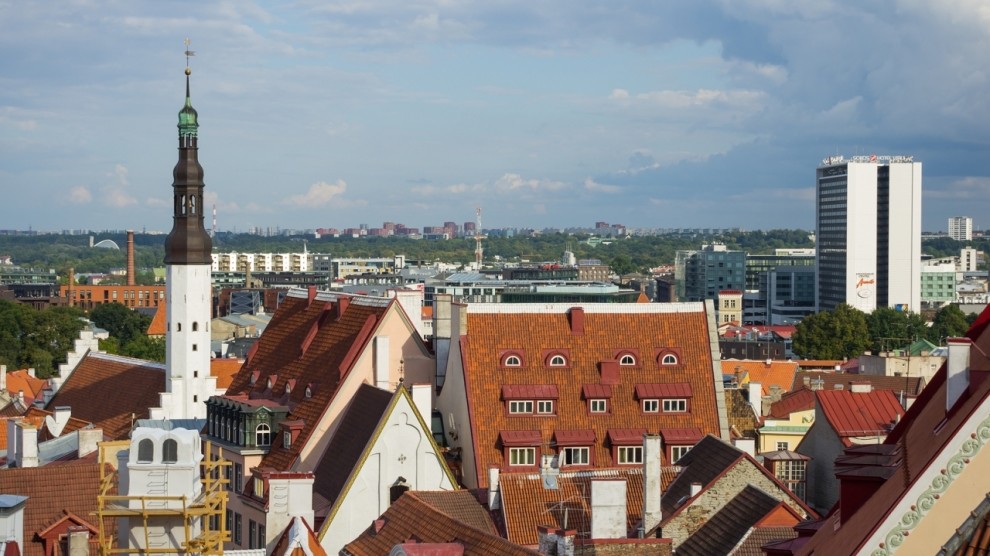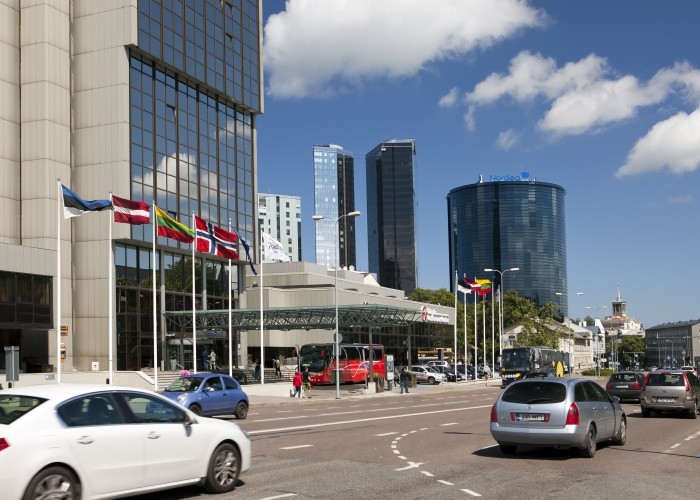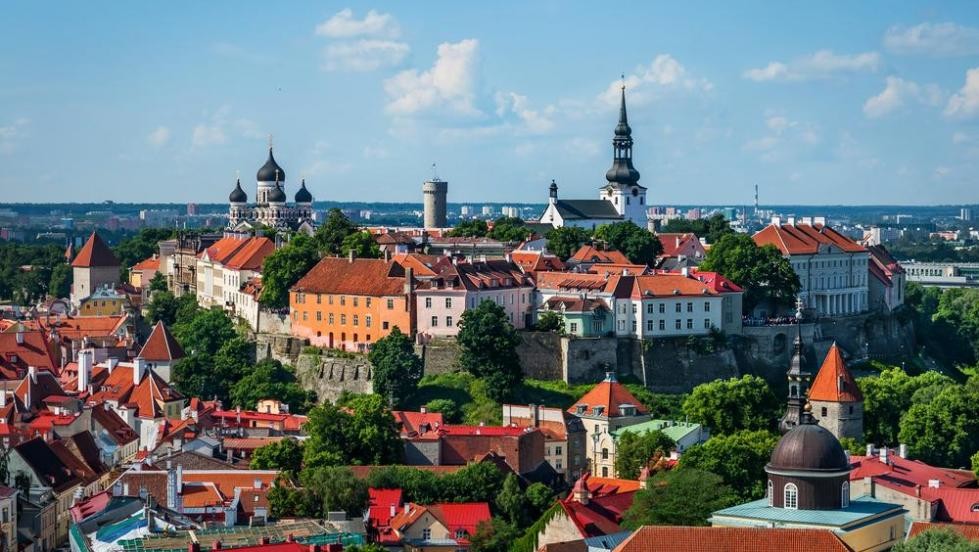My experience in Estonia and cross-cultural psychology
The day I was informed that I got Erasmus Mundus scholarship (not a bad one by the way) I was literally on the cloud nine, and honestly, all the time going there, and even afterward, I cared less about culture shock and all the problems related to that, I was too excited to be worried about psychological distress, psychological or sociocultural adjustment, communication failure, language-related problems and so on, I was just full of plans and ideas and my main motto was “As long as I am here, I should make the most of it. ” But I have to admit, I never got my hopes too high and always tried to keep them rational and realistic “hope for the best, expect the worst” had become my second motto.
The initial positive disposition perceptibly helped me in an adjustment process. The only thing I was actually worried about was being away from my family for so long, and Georgia is more like collectivist society than individualistic, where family ties and bonds are very tight, and the sense of belonging is crucial for happiness and satisfaction with life. As Estonia was my first experience of living abroad, I thought it would be much harder to cope with the distance, but it turned out totally all right (thank you Estonia for Skype!). Morning calls from my mother were a kind of everyday medicine I started my day with and having dinner “together” with the whole family was a perfect end of any stressful day, reducing any anxiety I had had to face during the whole day. But that was in the beginning, as time passed, I felt more and more like at home in my tiny dorm apartment, and my flatmates became my second family.

As the main problem was solved thanks to modern technology, there was nothing much left to be worried about. I would rate myself quite high on cultural intelligence scale at all four dimensions, including metacognitive, cognitive, motivational and behavioral [1] intelligence. As for my metacognitive intelligence, I do believe I am good enough at acquiring and understanding knowledge relevant in cross-cultural settings and I always try to be conscious when it comes to applying knowledge to the cross-cultural interactions. I can’t say I am perfectly aware of all nonverbal behaviors in other cultures, but I think my cognitive intelligence is enough to avoid major misunderstandings during an interaction. I would rate my motivational intelligence with the highest score, moreover, I have always had a genuine strong desire to meet people with different cultural backgrounds and I do enjoy conversations generally. Behavioral intelligence is a bit tricky point, but I have to be honest, no matter how much you try, your culture is very deeply rooted and embodied in you, without putting effort and being conscious all the time, it’s difficult to alter for example facial expressions, even when it is required.
I have never thought before, but as I got familiar with the common stages of cultural adjustment in my intercultural psychology class, I tried to label my experience abroad within these four phases. And what is more, I was certain that my experience is Estonia was never stressful, or I believed I had never had to use any coping strategies, but now, looking back after getting to know a bit more about, I realize that unconsciously I actually used a number of coping strategies, and I guess, I handled it all pretty well, taking into account I never even noticed that I was using those strategies to deal with stress or ambiguity.
I definitely experienced “the honeymoon stage” when I was excited about all new basic things, initial euphoria, motivation and interest of learning, hectic social life full of events and activities resulted in the feeling of ability that I could handle everything, I made myself believe that I was not going to have any problems, I assured myself “come on, Eva, life is amazing here, you just need to be open to new things and experiences, keep an open mind! ” so equipped with optimism and one single word from Estonian language-“terviseks” (which means ''cheers'') I started my exchange year.
In the process of psychological and sociocultural adjustment predictors as social support, personality traits, language-related factors are indeed crucial [2]. The social support coming from my “Georgian squad” helped me a lot in the beginning, the first couple of weeks I was never alone, all the time we were literally sticking together, hanging out having fun, of course, we met new people but still we were “us” one team, in the same boat, facing the same difficulties and problems. We shared the same cultural background so things which one found new or weird was also novel for others, and of course common language played a significant role, no one can understand Georgian jokes the way another Georgian will, and humor, you know, is a very important thing. To cut a long story short, I had a feeling of belonging with people of my own nationality, the social support provided by them was crucial in the adjustment process, which helped me to cope with the loneliness I might have to face during living in a foreign country.
Then time passed and after a couple of weeks, I made new friends, not Estonians unfortunately, other exchange students. I do believe my English proficiency greatly helped me to facilitate social interaction with other international students, I never found it difficult to interact with people, express myself and make new acquaintances. English speaking students, not local Estonians, seemed to be kind of a community I was integrated into. What strikes me again is that, people I got the closest to, were either from Italy or Spain, who are more close to Georgians with mentality and temperament (there are a lot of differences, by a lot of I mean really a LOT ) we are both friendly and open, always glad to have a conversation over a glass of wine, we share a lot in common; some cultures treat mealtimes as opportunities to fuel the body but for us mealtimes is a time for social interaction, we adore the process of eating and having a friendly chat, and for us having a meal is not just eating, it is an interaction, process, the time to enjoy and relax. On the other way, no matter how much I tried I was not able to hit it off with Finns. Their “personal space” thing is killing me! They don’t even kiss or hug when they greet a friend! I always looked at cultural stereotypes with skepticism, but the example of Finns proved that stereotypes are not some air-brushed statements!

I definitely have not experienced so-called “culture shock”, maybe because Georgia is not that different from Estonia, and to some point, all post-soviet countries share quite a lot in common. Another thing was that my Russian language proficiency is pretty all right and as a wide majority of the population of Tallinn speaks Russian, even in the streets, in the crowd I never felt like a stranger or alien, I could understand what people were talking about, I could hear their conversations. Even though I realized a lot of minor differences, I never focused on them. I tried my best not to be stressed out by problems and not to feel frustration. I think what helped me the most, in this case, was my internal attribution bias, I always try to seek the problem in my own traits, abilities or feelings, rather than in situational factors. So, whenever I feel that something is not going well, I blame myself try harder, push more to reach the desired goals, or if there is something out of my control I just try to "take it easy”. Of course, this sounds perfect and easy but in reality, not always everything goes as smoothly as I want to, and what I just mentioned above is my hypothetically ideal way of solving problems. I have to be honest, I had days when I wanted to be home like crazy, craving for food cooked by mom and so on, but for the days like that there is chocolate, movies and a bunch of other master stress reducers that work perfectly fine.
Everything would have been totally amazing was not it for the weather! I can say without any hesitation, I literally “survived” winter here, after -25 degrees in Estonia, I will not even consider Georgian coldest months as “winter” at all. To begin with, it lasts too long! From November until April! And the lack of daylight was excruciating, I had never seen night at 4 pm! As the weather in Georgia was getting better and better more and more frustrated I felt, I have never been so concerned with the weather before, but since I lived in Tallinn I downloaded special applications on my phone to be constantly up to date with weather changes. I was on the verge of a nervous breakdown because of sitting home, not being able to go out plus I had holidays from university, so I had a bunch of free time I had no clue what to do. So, I came up with the idea to start working out! YouTube tutorials with my trainer Rebecca (not only mine but also of 1093830 youtube viewers as well) helped me to cope with burning accumulated energy due to not going out. But winter was still there with its depressing mood, so I was very happy when my 2 friends from Georgia visited me during the Christmas holidays. I would lie if I say I was depressed, homesick or anything, but it was kind of refreshing to have my own people around, filling me with the feeling of “home”. We had an amazing time freezing outside in -20 degrees and parting all night. One more thing, white nights are very beautiful though!
I think I skipped the stage of gradual adjustment when you become more familiar with the culture and start to feel comfortable because I never felt isolated and uncomfortable, but neither I felt involved in Estonian lifestyle either. Even though I noticed before, even on my honeymoon stage, that Estonians were cold and not very friendly this never bothered me, luckily, my sense of humor has never left me, so from the beginning I was able to laugh at some of their features and ways of doing things, but I never ever found anything annoying. My internal attribution bias helped me again, I could not make Estonian friends not because they were cold, but because I never put the effort in finding them, which I really regret now, so take it into account and try harder.

I suppose I did not experience the stage four either when you finally adapt to the new environment. Again, the reason was that I “felt like home” from the beginning, and cultural differences did not seem that big. Gradually my life satisfaction here in Estonia is quite high, I have had a great time, enjoying my exchange year so there was nothing to adapt to.
I acquired a number of skills during my stay in Estonia. Below I will try to label them within cognitive, behavioral and affective skills [3]. As for my cognitive skills first and foremost I would mention is the knowledge I gained about history, politics, educational system of Estonia, and also I got more familiar with the Nordic model of the welfare state and the concept of social democracy. What is more, sounds paradoxical but through dotting differences between Georgia, Estonia and other countries, I got more aware of my own culture, I have never been so interested in my own culture before, I started to read more about Georgian culture, traditions, social, political and economic system in order to compare differences.
About acquired behavioral skills, of course, taking into account the fact that I have always been extremely dependent on my family, I greatly polished and fostered my language skills, but what first comes into my mind is that I acquired living skills, ability to live and deal with multiple issues related to living alone “by myself”. Shift from living with the family to living in a dormitory was a great transformational point in my life. Especially I am an only child and everyone has always been spoiling me, I have never had duties or household drudgeries to do, I have never been in charge of cooking, managing my own budget, buying stuff for home and so forth and suddenly I was in charge of everything, I felt like “mom” of my own self, I was who was taking care of, and I was the one who was taken care of by. I remember in the beginning I was calling mom to ask which regime to put on washing machine for specific clothes, or which washing powder to buy. Maybe there is nothing culturally specific here but still deserves to be mentioned, because I am extremely proud of my acquired living skills, finally I started to feel like an adult, and l felt responsibility for myself. To some point, something culturally specific might be in play, as Estonia is individualistic, where children start to take care of themselves at an early age I was also encouraged to feel and act more like an adult, whereas home everyone still calls me a kid, and think that I am still not ready to live on my own. Another honorable mention is healthy eating, I started to eat more healthy here, maybe it is my wrong impression but Estonians seem to be obsessed with vegetables, fruits, plural greens and kohukes, so seeing a huge amount of healthy food at the stores I also was encouraged to eat in a healthy way. Maybe healthy eating was my other coping strategy which I used unconsciously.
I can say without any hesitation, that acquired affective skills are most substantial and considerable for me. I appreciated and embraced differences across cultures, people and basic ideas. A major difference in attitudes or ideas which might have been the solid reason for a heated argument in my home country, seemed like minor disparity here, in a multicultural environment. I got aware of other cultures and also to the fact that even though our cultures tend to be very different, even with contradictory values, and differences in socially acceptable behavior, but at the same time we are all so similar; we enjoy the same things: same TV series, same books, we even can laugh at same jokes, I realized we are far more similar than I could have ever imagined. I stopped to look at the world from a “Georgiacentric” point of view, I can give a simple example, the history books I studied within Georgia are full of patriotic spirit and are very subjective, “Georgia had wars with bad guys Turks”, bad ottoman empire, bad guys who wanted to take own religion, identity, culture and so on, but living in a flat with Azeri girl I started to question “rightfulness” and the legitimacy of my history books. I also started to respect other religions too, I got Muslim friends who taught me a lot and now I am very proud of my tolerance and appreciation of differences.
Living in a multicultural environment opened up new opportunities of seeing existing things of the world in new ways, it increased my overall openness to new experiences which led me to more creative ideas. I realized that my ways of doing things are just one choice among millions in the world, that there are different approaches to life. The people vary and they have different ambitions; there are many different ways of achieving goals, and there are different goals that people might find worth seeking. Another thing that happened to me was that I recognized that everything can be seen from many different perspectives and there is no such thing as the ultimate truth, there is no “wrong” or “right”. At the end of my experience as an exchange student, I got new motto “always keep an open mind”.
[1] K. T. Wang, P. P. Heppner, L. Wang, F. Zhu. Cultural Intelligence Trajectories in New International Students:
Implications for the Development of Cross-Cultural Competence. International Perspectives in Psychology: Research, Practice, Consultation. 2014 American Psychological Association
2015, Vol. 4, No. 1, 51–65
[2] R. Hirai, P.Frazier, M. Syed. Psychological and Sociocultural Adjustment of First-Year
International Students: Trajectories and Predictors. Journal of Counseling Psychology, 2015 American Psychological Association. 2015, Vol. 62, No. 3, 438–452
[3] E. Root, A. Ngampornchai, ''I Came Back as a New Human Being'': Student Descriptions of Intercultural Competence Acquired Through Education Abroad Experiences, Journal of Studies in International Education2013 17: 513 originally published online 6 December 2012 DOI: 10. 1177/1028315312468008
Photo gallery
Content available in other languages
Share your Erasmus Experience in Tallinn!
If you know Tallinn as native, traveler or as exchange student... share your opinion on Tallinn! Rate different characteristics and share your experience.
Add experience →


















Comments (0 comments)